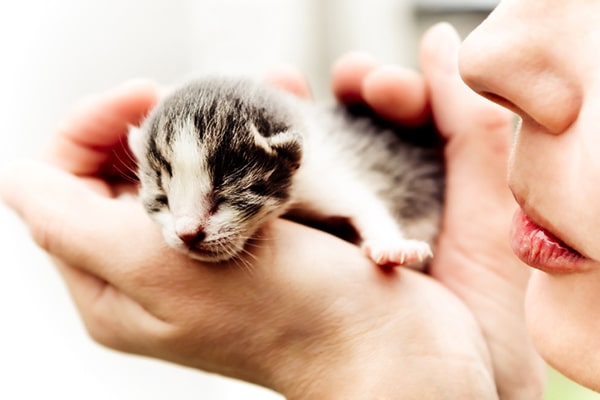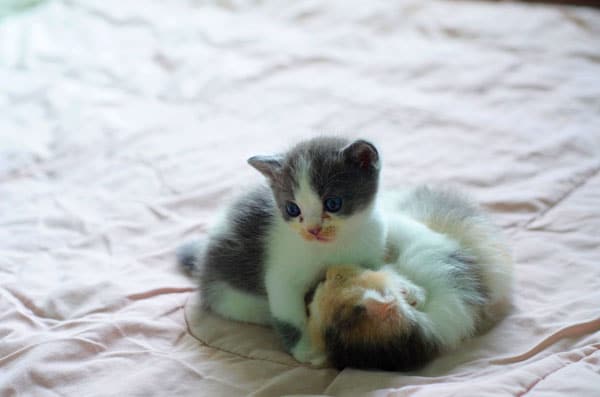What are the stats?

The most recent sources I've consulted estimate that even under the best circumstances - in well-managed catteries - 15-27% of kittens die before the age of nine weeks.
Not surprisingly, therefore, foster kittens are not the best placed in the statistics. Being orphaned or abandoned at an early age, with no prospect of a father in the picture, does not give an individual much of a head start in life. Mortality among litters of kittens in foster care can be extremely high. It is not uncommon for the mortality rate to reach 100%.
Why does the kitten in decline syndrome occur?
And, more importantly, what can you do to prevent kitten declining syndrome?
The word "syndrome" should be a clue. Kitten syndrome is not a single entity, but rather describes a large number of problems and conditions that can cause the death of young kittens.
Related: 7 things to do if you find an orphaned kitten
Most kittens that die of the discolored kitten syndrome seem to get sick and die suddenly. However, with a few exceptions (such as hypothermia and trauma), the problem usually develops gradually but is very difficult to detect until an attack develops. I'm sorry to say that the prognosis for kittens in crisis is bad. Therefore, the key to reducing the number of deaths due to kitten extinction syndrome is the early detection of subtle problems before a seizure occurs.
Causes of fading kitten syndrome

In the event of an attack, almost all kittens that fade show similar symptoms. Profound lethargy, low body temperature, pale gums, low respiratory rate and the inability to root, nurse or eat are almost universal signs of the syndrome. However, these signs can be caused by a wide range of problems.
Inadequate mothering - by the feline mother - is a major risk factor for the declining kitten syndrome. Most foster kittens are subject to this risk factor in the extreme, as they have been orphaned or abandoned by their mother. Even kittens whose mother is in the picture may be at risk if her mother is inexperienced, unable to produce enough milk, unwilling to let the kittens suckle, stressed, malnourished or, paradoxically, obese.
Traumatism and hypothermia are two causes of the kitten syndrome that fades away and occurs really suddenly. Trauma most often occurs when a kitten falls from a height or is crushed. Hypothermia occurs when kittens are separated from each other and from their mother in a cold environment. Note that hypothermia is either a cause or a result of the kitten passing out. Almost all kittens in crisis that fade are hypothermic.
Infectious organisms are often responsible for the kitten fading syndrome. Kittens are at risk of septicemia due to bacterial infections. Viral infections by organisms such as feline herpesvirus, calicivirus, panleukopenia, feline FIV/AIDS and feline leukemia virus can trigger the syndrome. Parasitic infestations by roundworms, coccidia or other organisms can trigger attacks. Many of these infections are related to a breakdown of the immune system, which is usually associated with a condition called thymus atrophy.
Hereditary defects ranging from heart irregularities to a poorly developed immune system can cause the discolored kitten syndrome.
Hemolytic anemia is another possible cause of this syndrome. This condition can occur when a kitten has a different blood type than its mother. When the kitten nurses during the first days of its life, it ingests antibodies that attack its blood cells.
Treat kittens that fade and prevent seizures
Kittens in crisis must generally be treated by veterinarians. The main elements of treatment are thermal support, fluids, dextrose (sugar) and often antibiotics. If the affected kitten begins to warm up and recover, nutritional support and deworming medication can be added. Unfortunately, the prognosis for kittens in crisis is poor, and many do not survive even with treatment.
What are the signs of kitten syndrome in decline?
Seizure prevention is essential to reduce the number of deaths due to fading kitten syndrome. The first signs of the disease are subtle but often detectable. Sick kittens may not stand upright when turned on their back. They may not take root and suck normally. Their eyes may not open at the usual age of 5 to 14 days. They are often smaller than their littermates.
Most importantly, they may not gain weight normally. Healthy kittens should gain 7 to 10 grams per day. Experts recommend weighing kittens on a gram scale at least once a day (and many experts recommend weighing them twice a day). High quality gram scales can be purchased at kitchen supply stores, smoking rooms (you can guess what the scales are for some people) and online.
Kittens that don't gain weight at an appropriate rate need special attention, especially with regard to feeding. Newborn kittens should be fed formula or milk every two hours. Porridge weaning can begin at about four weeks of age.
A kitten lost to kitten extinction syndrome can sometimes be a warning sign of problems for other kittens in the litter. A veterinarian should evaluate the mother and any kittens remaining after such an incident.
A last word on the endangered kitten syndrome
Although this article is intended for foster parents, I will add a few tips for breeders. Both sire and dam should have a blood test before breeding, and this information should be used to prevent hemolytic anemia. Both should be tested for feline leukemia and FIV. The dam should be fully vaccinated and dewormed prior to breeding. And don't forget that the milk consumed on the first day or so, called colostrum, is the most important milk that kittens will consume because it contains antibodies that protect kittens from disease.
With diligence and early detection, some cases of declining kitten syndrome can be reversed before a crisis develops. However, I am sorry to say that many other cases will not respond to the efforts of even the most involved foster parent. Foster parents, be aware that even though the loss of a kitten - or even an entire litter of kittens - is heartbreaking, it doesn't necessarily mean you did something wrong. Please keep up the good work.